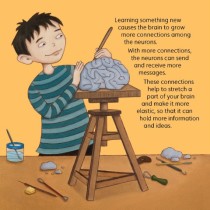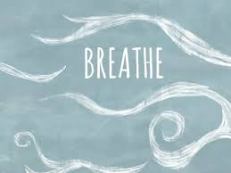I have been reading many articles about why New Year’s resolutions don’t work. Often times we think of what we ‘wish’ for rather than setting specific goals with the exact steps we need to take to achieve them. It is sometimes easier to set these goals and reach them if you have someone to support you. So, if you are a teacher reading this, guess what? You have a class of bright-eyed students who are there for you! If you are a parent or caregiver, try setting a goal with the kids in your life…it could turn out to be a wonderful way to connect and share a thoughtful experience this year.
 I thought about the things I do in my life everyday which are what I would call a ‘healthy habit’. Things like brushing my teeth, drinking water, telling my family I love them before I go to sleep…little things that make me feel good and that I have done so many times I don’t even have to ‘think’ about doing them anymore.
I thought about the things I do in my life everyday which are what I would call a ‘healthy habit’. Things like brushing my teeth, drinking water, telling my family I love them before I go to sleep…little things that make me feel good and that I have done so many times I don’t even have to ‘think’ about doing them anymore.
So I decided to make a simple list of 3 ways we can develop some new ‘healthy habits’ with our kids this year, be it in the classroom or at home. These are ‘habits’ that I am working on developing in my own life, and things that I find help me stay mindful throughout my day. You don’t have to try to do all 3 at once. Do what works for you. Often as teachers and parents we are in a ‘time crunch’, balancing schedules and trying to fit it all in. Sometimes we are so busy filling timetables that we forget to take a moment to just stop and breathe. That is what these 3 suggestions are for- and you only need to take a few minutes in your day to do them! Take a moment to be reflective, giving yourself and the kids in your life some time to re-focus and work on developing ways to weave being ‘mindful’ through different parts of your day.
Creating healthy habits means we have to ‘practice’ this new habit everyday. When we practice something everyday, we actually strengthen our brain by creating new neural connections. Soon these connections will be so strong that this new practice will be like second nature to us. This is part of what we call neuroplasticity.

So here is my list, enjoy!
3 Ways to be Mindful with Your Kids in New Year:
1. One minute of mindful breathing.
Check out my post Just Breathe to get all the ins and outs of mindful breathing. One minute of mindful breathing can be a powerful way calm our minds and settle our emotions. Deep breathing sends a message to our brains that we are OK and gives us time to think clearly and make better decisions. If we practice this daily with our kids this will become a ‘healthy habit’ to use whenever they need a moment to calm down or re-focus their attention (it might work for the adults too!).
A great way to start your day- simply write down 3 things you are grateful for in that moment. It doesn’t have to be anything life changing, maybe just that your favourite song came on the radio or you were on time for the bus. When we pay attention to and write about positive experiences everyday, we will soon start becoming more aware of the positive things that are constantly occurring all around us. We are shifting our mindset to have a more optimistic outlook and learning how to be more mindful of every moment.
3. Perform a random act of kindness everyday.
I once had the privilege to hear Shawn Achor speak, author of The Happiness Advantage. He talked about the 7 Second Smile Experiment where if you smile at someone within 7 seconds they will almost always smile back at you. What causes this are mirror neurons firing in the brain. When we see someone smile, our brain fires neurons to mirror this well before our face will. A single positive change can create a ripple effect outward.
Challenge your kids or students to try and perform one act of kindness at some point in their day. Whether it is a simple smile at someone in the hall, holding the door for someone, or letting someone go ahead of you in the lunch line. These small acts are the ripple effect, creating deeper empathy and compassion for others and being aware of how our actions truly to have the power to affect change.



